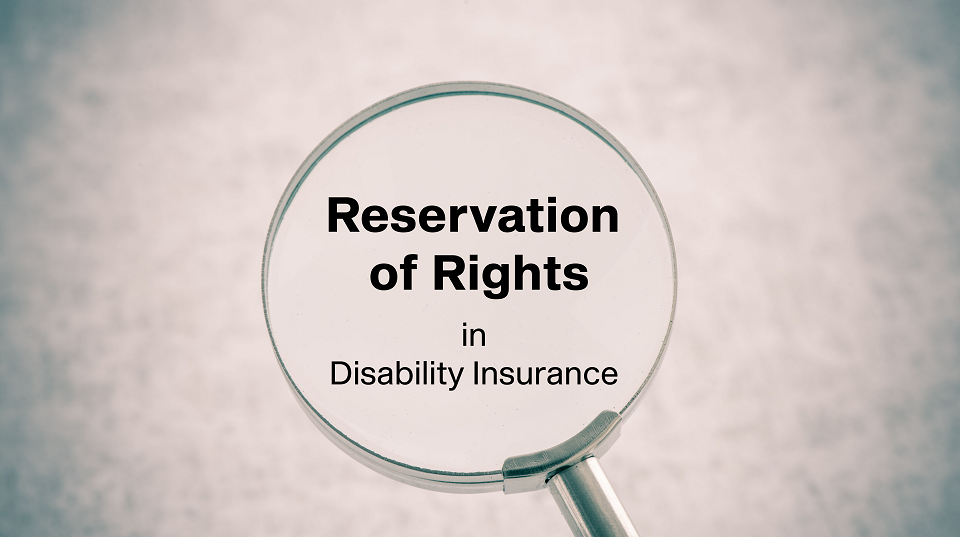Applicants for disability insurance can often receive a mystifying response to their claim for benefits, an approval under a “reservation of rights.” After submitting a claim and providing a treating doctor’s certification of disability along with other medical evidence supporting a favorable claim determination, the expectation is that the claim will be approved. But what does it mean when the insurance company notifies a claimant that it is asserting a “reservation of rights.” The good news is that an approval under a reservation of rights is not a disability claim denial; however, it is also not the same as an unqualified approval of the benefit claim.
Table of Contents
What Does Reservation of Rights Mean for Your Claim?
A reservation of rights means that the claim has been approved, but with qualifications. It also means that benefits may continue, but it could also mean that further investigation of the claim may result in a claim denial and may also mean that any payment accompanying a claim approval under a reservation of rights comes with strings attached. In other words, the insurance company may later ask the claimant to repay any benefits paid under a reservation of rights.
Why Do Insurers Issue a Reservation of Rights?
A reservation of rights may occur for a number of reasons. Most often, it occurs because the insurance company feels it is in need of additional time to investigate a claim, but it is obligated, either under regulations promulgated by the U.S. Department of Labor under the Employee Retirement Income Security Act or under state regulatory guidelines, to issue a decision within a specific timeframe.
It may also occur due to an insurance company’s concern that it may be found to have acted in “bad faith” or unreasonably if it simply issues a denial without possessing all the relevant evidence. To insulate itself from a bad faith accusation, while it is not required, insurance companies often advise claimants that they will not be held responsible for paying back any payments made under a reservation of rights in the event the claim is later denied. However, insurers do not have to give up their right to seek repayment; and if the insurance company later decides the payment was unwarranted, it can sue its insured to recoup any benefits paid under a reservation of rights.
Another reason for an insurance company’s assertion of a reservation of rights is where the insurer believes that a policy provision or a stated exclusion or limitation in an insurance policy would preclude payment; and a reservation of rights may be coupled with a lawsuit seeking a “declaratory judgment” that the policy terms at issue negate any obligation to pay benefits.
On the other hand, when an insured begins to receive payment under a reservation of rights, it may be beneficial to the claimant because it provides needed payment when the insured is unable to work. In such situations, just as the insurer may be conducting further investigation of the claim before issuing a definitive determination, the claimant should use the opportunity to bolster their claim by undergoing additional medical testing, seeking a second medical opinion, or otherwise strengthening the medical evidence supporting the claim.
Although an approval of benefits without a reservation of rights gives a policyholder greater rights than if the approval was made under a reservation of rights, an unqualified approval does not guarantee that payments will be issued indefinitely. Even without a reservation of rights, an insurance company is permitted to continue investigating the claim; and if it determines that ongoing payment is no longer warranted, benefits may be terminated. The only difference is that payments made without reservation may not be recovered. The only situation in which payments made without reservation may be recouped is if the insurance company asserts the claimant committed fraud. Contrary to popular belief, though, fraud in disability insurance claims is rare.
What Claimants Should Know When a ‘Reservation of Rights’ Is Asserted
When a “reservation of rights” is asserted, the insured needs to understand what is contained in their insurance policy. Not only is the definition of “disability” crucial; so are other terms that could either limit or exclude benefit payments altogether. The other important take-away is that if a claimant receives an approval under a reservation of rights, they need to be aware of and understand the difference between such an approval and an unqualified approval and that ongoing payments are potentially open to challenge.
Claimants also need to have an understanding as to whether and why the insurance company has made a reservation of rights assertion and whether the insurance company may later seek repayment of any benefits paid under a reservation of rights. In any instance in which a reservation of rights is asserted, claimants should immediately seek legal consultation and advice from an experienced disability benefits attorney. In addition, if the reservation of rights is triggered by uncertainty as to the meaning of a policy term or a term in a policy rider or endorsement, obtaining prompt legal help is essential.
Seeking Legal Assistance in Reservation of Rights Cases
The attorneys at DeBofsky Law. are experienced in addressing reservation of rights issues and can assist claimants in seeking to turn a qualified approval under a reservation of rights into an unqualified approval.







